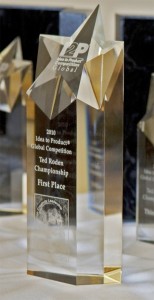Rene Jose Rodrigues Fernandes
November 4-6 I was in Austin, Texas as advisor to Janus, a team from the Federal University of Minas Gerais, who were participating in the global final of the Idea to Product competition. Janus won the spot by winning the finals of I2P Latin America, which took place in São Paulo, under the auspices of FGVCenn.
In Austin, the results were the same: competing against heavyweight schools like the University of Florida, RWTH Aachen University (Germany), Kennesaw State University, the University of Leuven (Belgium) and Stockhold School of Entrepreneurship (Sweden), Janus took first place.

Janus’ innovation is a product that permits the separation of oil and water. It may seem strange to suggest, since oil and water don’t mix. But when petroleum is extracted it comes out as an emulsion, blended with water, that must be separated. Today the industry uses chemical products called demulsificants to process the separation, creating a worldwide market of US$40 billion, US$2.5 billion of that in Brazil. Janus has come up with a process for separating the emulsion that involves carbon nanotubes and magnetic nano-particles.
These particles separate the emulsion simply, lowering the costs of the process by as much as 80% (representing a 5% reduction in the consumer cost of gasoline), and reducing the current 12 hours needed for the process to just 2 hours. The product has international patent protection.
The team includes students Aluir Dias Purceno, Aline Silva, Raquel Mambrini, and Ana Carvalho, with the guidance of professor Rochel Monteiro Lago from the Chemistry Department at UFMG and business coordinator Euler Santos, who has studied these technologies for eight years.
 The team took the first place trophy (a star, representing the Lone Star State), US$10,000 in cash and the cards of various businesses, incubators and investors interested in the technology. The next steps for Janus are to work on a pilot plant for testing the product on an industrial scale.
The team took the first place trophy (a star, representing the Lone Star State), US$10,000 in cash and the cards of various businesses, incubators and investors interested in the technology. The next steps for Janus are to work on a pilot plant for testing the product on an industrial scale.
The success of Janus this year and Nanoita last year in the same competition shows that Brazil has a huge potential to bridge the gap between inventions developed in laboratories and innovation, transforming research into products that can be useful to society and generate wealth for the nation, its investors and its schools (when the research originates from universities). We have smart people. What we need is more people (businesses, universities, and government) that believe in them.
PS – video of the presentation and judges’ feedback is available on the I2P Global site at this link: http://bit.ly/janus_i2p.
This post was originally published at Startupi.com.br



 Posted by Rene José Rodrigues Fernandes
Posted by Rene José Rodrigues Fernandes 



